Summary 
A rock-n-roll update of the slight comedy to a Catskills resort called Mount Windsor during the early 1960s. "Pistol and Nym" are a one-man ventriloquist act and his dummy, the crowd-warmer for seedy stand-up comedian Falstaff, on the run from Vegas and short of cash and options. The 1960s soundtrack sets a light and bouncy mood, and the production is jammed with references to Marilyn Monroe, "The Honeymooners," and commies and beatniks, plus the set features photos of Doris Day and Marilyn Monroe, Frank Sinatra and Buddy Hackett. The Pages resemble Rob and Laura Petrie, Sir Hugh is an Elvis impersonator, and Doctor Caius is a thickly-accented golf pro. Even the intermission is an audience-pleasing interlude, an on-stage mambo lesson with cast members and crew guiding audience recruits through a dance routine. The show is not only quickly-paced and clever, featuring a cuckold dance with male characters like back-up singers then a wild chase of Falstaff-in-drag set to the Surfaris' surf-guitar-oldie "Wipeout," but there are wise textual choices, such as changing the play's laborious closing humiliation to a colorful Halloween party prank, so even Falstaff can be included in the closing "Be My Baby" dance.
Design
Directed by Seth Panitch. Scenic design by Kent Homchick. Costume design by Hugh Hanson. Lighting design by Shannon McKinney. Sound design by Jason Ducat.
Cast
Peter Simon Hilton (Master Ford), Michael Winters (Falstaff), Geoffrey Kent (Doctor Caius), Tammy L. Meneghini (Mistress Quickly), Vanessa Morosco (Mistress Ford), Rodney Lizcano (Pastor Hugh Evans), Sammie Jo Kinnett (Pistol and Nym), Scott Bellot (Master Page), Kyra Lindsey (Anne Page), Mare Trevethan (Mistress Page), Sam Sandoe (Shallow), Ian Andersen (Slender), Benjamin Bonenfant (Host), Joshua Archer (Fenton).
Analysis
The Colorado Shakespeare Festival blasts golden oldies from 1962 across the Mary Rippon Theatre's outdoor sound system, and with song after song the mood as the audience takes its seat is somewhere between edgy "American Graffiti" and wholesome "Happy Days." The slew of songs include Gene Chandler's "Duke of Earl," Neil Sedaka's early-version "Breaking Up Is Hard to Do," and (I think) The Isley Brothers' cover of "Twist and Shout." The time is the early 1960s, and when the Festival's artistic director finishes his opening remarks, he twirls and grabs the old-style microphone at center stage, then delivers a Las Vegas introduction of the ventriloquist-and-dummy act of Pistol and Nym, played by Sammi Jo Kinnett and well, a dummy. This opening ingenuity, along with the upbeat and agreeably cheesy score, set a pleasant and spirited tone for the production, which always amuses and often delivers laugh-out-loud moments among a sprinkling of misfires. The kind of funny but kind of creepy Pistol and Nym warm-up act, with the little Corporal wearing little checkered pants, gives way to the headliner, stand-up comic Falstaff in his bad brown toupee, white Pat Boone shoes and velour blazer, insulting audience members' clothing - "when did Bozo die, I must have been out of town" - and growing concerned at boos and polite-at-best laughter. As his act dies a slow death in the glare of its Vegas spotlight, Michael Winters's aging Falstaff gets heckled, and his protest, "I have heard the chimes at midnight!" is an inside-joke nod to the Festival's Henry IV this season, as is the heckler's stone-cold response from the audience: "I know thee not, old man."
Director Seth Panitch uses a crew of five set-changers, two guys in khaki slacks, three girls in light brown skirts, all wearing purple tops and scurrying across the stage with 1960s television family sit-com wholesomeness. Brown and yellow curtains cover stone arches like Cleaver family home decoration, and the balcony above is lined with a white-washed railing, a city hall-type dome building-top in the distance. An upstage wall spins, revealing a variety of settings, all within the Catskills resort community of Mount Windsor: Falstaff's hotel room boasts autographed photos of Frank Sinatra, Dean Martin, Elvis Presley, Sammy Davis Jr., even Buddy Hackett and Liberace; Mistress Quickly's parlor features photos of Elizabeth Taylor and Doris Day; the Page living room includes an enormous upstage drape with a headshot of Twiggy; and Mistress Page gets her nails done in a 1.4 beauty salon complete with three big gray hair-dryers upstage. Panitch weaves the set-changing crew seamlessly into the production, one girl swooning while another faints into the arms of the third as teen-idol Fenton arrives 1.4 in sunglasses, jeans rolled up quite big, and a snug lime-green sweater. Later the boys change the set to Sam Cooke's "Twistin' the Night Away," pausing to do the Abbott and Costello "Who's on First" bit.
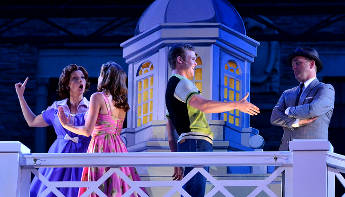
Mount Windsor is an idyllic town, and Panitch shows children rushing toward the chiming bell of an ice cream truck and Elvis-side-burned Pastor Hugh at center stage with his black Bible, setting up a shuffleboard game, while mad man Master Page poses as if in a Sears Roebuck catalog nearby in his gray suit and skinny tie. Shallow plays shuffleboard with the pastor, both looking up as high-heeled Anne Page appears in the balcony, her pink skirt blowing up around her a la Marilyn Monroe, and they hold their shuffleboard paddles as if erections. Even the bit-part supporting characters are played with liberal doses of color, such as Slender being a far-from-slender suitor of Anne, a big circular man in slicked hair like Chris Farley, wearing a loud light-blue sport coat with a red power tie. When he hears a dog barking in the distance, he yanks off a black loafer for self-defense, and his urgent whisper of "sweet Anne Page!" becomes a running joke he repeats every time her name is mentioned. Mistress Quickly is a wise-cracking northeasterner in a pink skirt, clog-like heels, an orange-and-white candy-striped blazer, plus curly red hair, delivering Falstaff's identical letters 1.4 to the tune of, of course, The Marvelettes singing "Please, Mr. Postman." Less amusing in the shotgun barrage but still colorful are the Host played as a New Jersey-accented pimp wearing a purple shirt under a black suit, and Shallow in a running gag in which he seems always in the throes of a heart attack.
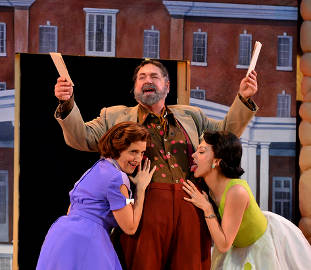
The highlight performance comes from Winters, his big Falstaff just the right amount of age and pathos to inspire sympathy, but bearing just enough puffed-up vanity to invite ridicule. He arrives 1.3 to Jimmy Dean's baritone "Big Bad John," checking into his Mount Windsor hotel suite with requisite luggage, table with vanity lights, and nightclub-act wardrobe. He tells Pistol and the dummy Nym about Mount Windsor and the merry wives, who appear upstage in sunglasses, wearing tennis skirts and tennis shoes, posing with their racquets. After Barrett Strong's "Money (That's What I Want)" finishes echoing, Falstaff moves downstage to a microphone stand. His Don-Rickles-in-Vegas styled stand-up act - "from up here it looks like feeding time at the zoo" - matches the character's advancing age and old-fashioned ways, both out of place in the modern idyll of Mount Windsor: "should I go a little slower for you folks over here?" When he continues his discussion of the town and his plan to cuckold the husbands - "we shall thrive!" - the wives appear again in the upstage doorway to pose suggestively amid lewd musical accompaniment. Winters's Falstaff waddles suavely between them, the fantasy women making ooh and aah cooing noises, and after Mistress Page rubs his belly and Mistress Ford pretends to lick him like an enormous ice cream cone, they make submissive "I am not worthy" bows. Moments later in 2.1, the real Mistress Page, wearing a purple dress with white bows and purple ear-rings, reads Falstaff's awful love letter aloud ("you love Lowenbrau, and so do I") while having her nails done in a beauty salon. She is joined by a letter-toting June Cleaver-like Mistress Ford in white skirt and white pumps, snug green top and green earrings, and they squeal their response - "let's be revenged upon him!" - in simultaneous delight.
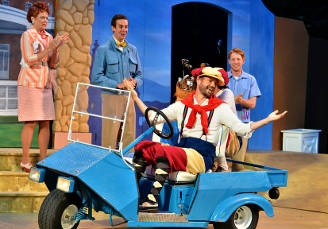
Geoffrey Kent, who directed the Festival's The Tempest this season, becomes an audience favorite as the outrageous Mount Windsor golf pro, Doctor Caius, channeling Inspector Clouseau and Monty Python. Caius arrives onstage driving a golf cart, his caddie Jacques Rugby riding aboard. Kent's bearded Caius wears a single golfing glove, a red sweater over his shoulders, suspendered shorts, spats and a cap. He lines up a drive 1.3 and takes a big swing, and in 1.4 he hunts within his home a la Ford in later scenes - "villain!" - in search of a romantic competitor. His walls feature a slew of photographs of him smiling in close-up with his golf cap, cradling tournament trophies. Some of the slapstick works well, like Caius pausing a conversation so he can look up "phlegmatic" in his English dictionary, but some scenes smack of scenery-chewing, like the caddie tossing him a club but throwing badly and missing - three times - or his repeated shouts of "ah ha!" when he opens doors in search of his rival. The high-noon 2.3 duel - "what is the clock, Jacques?" - takes place after another big golf swing and Kent's Caius swaggering wild-and-crazy Steve Martin-like into the audience. He puts his cap on a woman in the front row, encourages her to fondle the fabric of his pants, and after giving the Host a big kiss on the mouth, drives off to the duel, Rugby stomping hang-dog behind because he must walk.
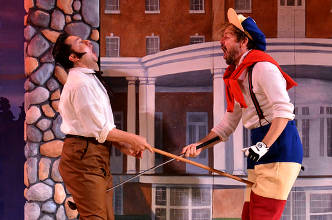
The 3.1 duel is with Hugh, an Elvis impersonator sporting big sideburns and using his shuffleboard stick like a microphone stand to bust some moves center stage. The audience is encouraged to clap their hands while the duelers wield golf club and shuffleboard mallet rather than swords. They of course manage to hit each other in the groin, and the two duelists, "the potions and the motions," make peace with Kent's Caius kissing Hugh on the mouth. Kent's portrayal draws applause, but too often drifts over the top: at the conclusion he makes his revelation that he has been paired with a male set-changer rather than Anne with hands-on-cheeks showiness - "I am cozened!" - then drops to a knee to propose marriage and rush offstage after another big kiss
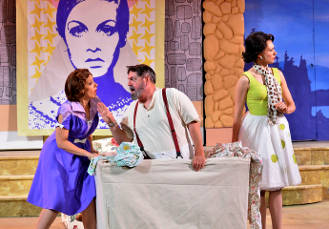
Panitch's production is at its best in the scenes featuring Falstaff tricked by the Wives and Ford's fuming jealous failures. Winters's Falstaff is set up in 2.2 - "I couldn't sleep at all last night!" from Bobby Lewis's "Tossin' and Turnin'" - scrambling for his toupee when Mistress Quickly arrives. Peter Simon Hilton's hyper-serious Ford arrives in disguise as Brook, a pencil-mustached beatnik poet in a gray sweater vest over a black turtle neck. Hilton plays Brook with a French flourish, wielding a cigarette holder and crossing then quickly re-crossing his legs, and after finger-snaps he transforms - following Falstaff's hip-thrusting boast to "awe him with my cudgel" - back to the furious Ford. He tears up Falstaff's headshot photo and flings it into the audience, and he rips off half his mustache with a twist and a scream, then the other half with a careful tug and a half-whispered "ow." He chokes on and spits the word "cuckold," condemning Falstaff with, "I'd rather trust that Frenchman Caius with my cheese." Panitch highlights the obsession with a dance sequence, the bass-heavy "Peter Gunn" television theme thumping as male actors, clad in black robes, wearing the horns of cuckolds, dance in tightly-choreographed moves around Hilton's Brook. Winters's lover-boy gives a shave-and-a-haircut knock then bursts onstage to stripper music, posing upon the couch in a smoking jacket. He struggles to drop romantically to one knee but resists Mistress Ford's help - "no, I'm fine" - then tears open his shirt and drops his pants to reveal black-dice boxer underwear. Soon he is trembling behind Twiggy then lunging within the laundry buck basket, saved by Ford's clipped command to two struggling servants: "get the buck out of here!" Panitch then pauses for intermission, but the show does not flag, as the set changers roam the audience for volunteers to enter a mambo dance contest onstage. Led by expert dancers - "hi, experts!" - the audience members compete in a complicated little routine that - after some practice - includes a la cucaracha sidestep move. They dance to The Four Seasons' "Stay" - "just a little bit longer!" - then switch partners, ending to big applause and with one young woman named, after a thigh-patting drum roll, "winner."
Winters's Falstaff ushers in the second half with a rock-n-roll, kind of jitterbugging to The Contours' "Do You Love Me?" with the cast singing backup and dancing behind him. After a 3.4 interlude with Fenton and Anne sunning themselves and holding hands between two center stage chaise lounges - "You Must Have Been a Beautiful Baby" plays as Page separates their lounges and covers Anne's bosom - the story resumes 3.5 in Falstaff's hotel room. Billie Holliday (I think) sings "You're Mean to Me" as the sneezing Falstaff pouts in white bath robe, shower steam billowing around him. The chatty orange Quickly soon has Winters on his hands and knees, pounding the stage trying to get in a word edge-wise, and Hilton's Ford giggles at the knight's humiliation: "I was shrived in grease like a Dutch dish."
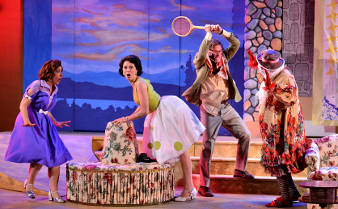
The 4.2 humiliation is repetitive of the first, but Winters's Falstaff is a continuous delight, leaping in the air with a high-pitched squeal, then growling at the stage-right buck-basket and the prospect of again being hidden within it. At the suggestion of disguise-in-drag, he stammers - "run, run, I must; I must run...where am I running?" - and disappears upstage. After Hilton's Ford freezes the two servants (with a bone-chilling shout: "step away from the basket!"), he dives in headlong, tossing laundry and emerging with a silk slip around his neck: "my jealousy is reasonable." Panitch's genuinely funny scene becomes even funnier when Winters re-enters in drag as an old aunt, and Ford with a tennis racquet chases him back and forth across the stage to the rousing twang of the Surfaris' "Wipeout." The chase continues in slow motion and ends with Falstaff's escape, Master Pastor commenting, "I like it not when a woman has a great beard."
Panitch's production plays with a soaring slapstick spirit that is very entertaining, the approach always fun, like Pistol and Nym arriving in town with luggage, including a tiny little suitcase for the dummy, or the whole town banding together 4.4 amid creepy early-TV sci-fi music, planning the trick of Falstaff while the horned and red-eyed Hunter looms above in the balcony. Even better, Panitch and team are consistently clever, adding topical references such as "The Honeymooners" ("to the moon!"), the Pages echoing Rob and Laura Petrie, and Pistol calling Falstaff "a base commie bastard." Even small moments stand out, like the two servants sound asleep, exhausted from their efforts at hauling Falstaff in the buck basket, or the lovely Anne kissing Fenton and giving a sly chk-chk finger-gunshot of approval to matchmaker Mistress Quickly. The style lends toward improvisation, as when the titular wives play up their prank of Falstaff with soap opera melodramatics, and one threatens to spank the other. Vanessa Morosco as Mistress Ford literally stops the show with her amused reaction to the response from a couple of gentlemen in the front row: hands on hips, she shakes her head and admonishes them with a "naughty, naughty" glance. But even in a production as big and engaging as this, the best moments are the truly revelatory, such as when the seething Ford, as Brook in disguise, storms past his downstage wife, and together as strangers they share a tango, alone and intimate, and she breaks free breathless with a glimpse of passion, ironically shared with her own husband.
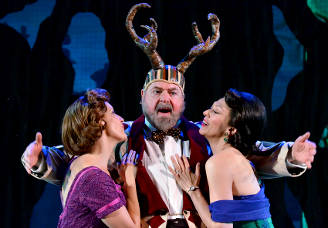
Falstaff's final humiliation, public before the whole town, can play in some productions with a ho-hum sense of repetitiveness, but Panitch and crew are inventive, returning Winters's knight to the stage 4.5 in a battered scarlet gown to the tune of The Four Seasons 1962 "Big Girls Don't Cry." Big bad John totters in red high heels - "how I have been transformed" - as Panitch cuts to the townspeople preparing a Halloween night prank. Kaye Ballard croons "Blue Moon" as the town dresses up as Halloween monsters - Nym a tiny little dummy mummy, Caius as Dracula, the Host a space alien, and Slender in a ghost's bed sheet but still wearing his big black plastic eye glasses - and by 5.4 Pastor Hugh has led a contingent of children offstage to take part in the surprise. Winters's Falstaff arrives 5.4 in a hat with horns, wearing shiny black shoes and a bow tie with his playing-card suit. His attempts to seduce the wives continue, and he charges them like a bull, then holds his arm around them until they pinch their noises and flee his body odor. They share a threesome dance to "At Last" and he tosses air kisses they pretend to catch, then throws out his back trying to lift Mistress Ford in a balletic dance move. The wives are poised to catch the charging knight mid-leap but are saved when the townspeople pounce and assault him, and Winters sags to his knees - "there's no place like home!" - in cowering fear. They continue the prank - "my deer!" - then the tables are turned on the Pages, who realize that daughter Anne loves the man of her choice and not theirs. The well-schooled Ford - arriving in a sharp tuxedo alongside Page - plays the calm-headed peacekeeper, and when Page finally shakes Fenton's hand in acceptance, then embraces him like a son, the happy ending begins. They all pause before exiting, and Ford returns to the slumped Falstaff at center stage - "I am dejected" - and helps him stand and propose marriage to Mistress Quickly before a rousing concluding communal dance to The Ronettes singing "Be My Baby."